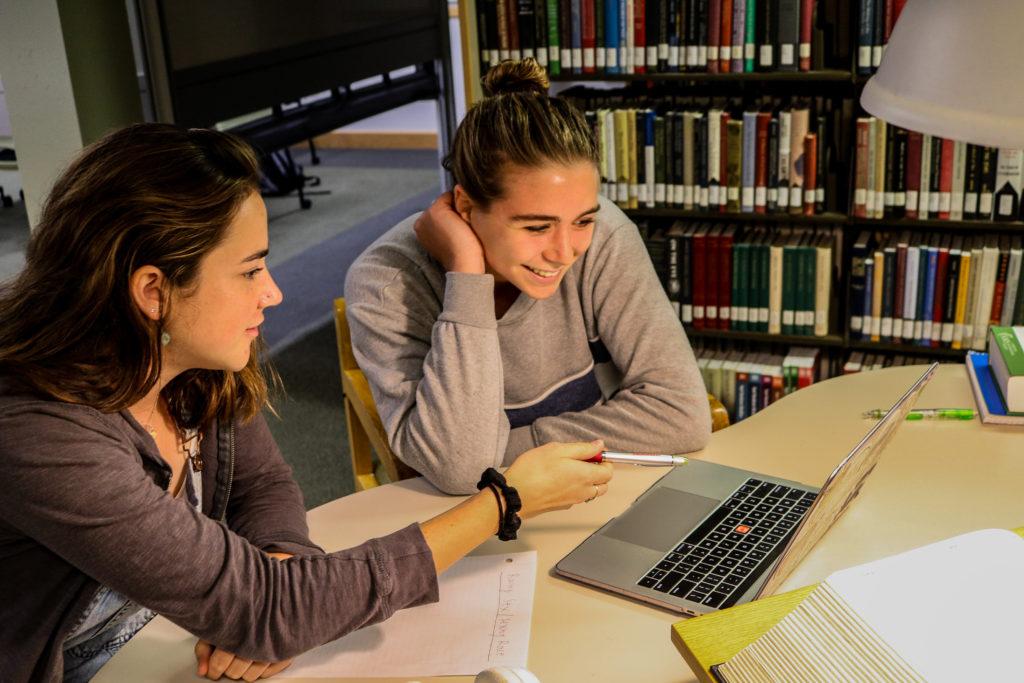By Montserrat Castro
castromon@grinnell.edu
Now located on the third floor in the north wing of the Humanities and Social Studies Center (HSSC), the Grinnell College Writing Lab is a resource that helps students with their writing assignments at any point of the writing process. The lab has professionals who offer their expertise on writing at appointments and drop-in times for any course, subject or piece of writing students might be working on.
“I think writing labs are important in general because they can be for anybody … It’s sort of the whole range of people, you know—people who are extremely confident and accomplished writers, people who much more feel that they’re struggling, people who usually feel confident but have pushed themselves out of their comfort zone to take a different kind of class,” said Tisha Turk, director of the Writing Lab.
Turk explained that there is no category or subject limit to what the program will help students with. Whether it’s a graduate school or study abroad application, presentations for the Research Symposium, extracurricular writing for fun—“You know … if a Grinnell student is writing it, we’ll read it,” she said.
The Writing Lab is also in charge of two one-credit courses taught by the Writing Lab professional assistants, as well as EDU 301: Teaching and Tutoring Writing, taught by Turk. The class, previously a 100-level class offered for two credits, is now offered this semester as a 300-level four-credit class.
Turk, who has previously taught the class in other universities, explained that the change was due to her belief that students need a research project to explore their individual interests on writing. “It’s really an opportunity for people to control a big part of their experience in the class, which I think is important. But of course, if I was going to add that to the class, that was going to be a lot more work. And so it had to be a four credit class,” said Turk.
The class aims to teach students about a field of studies called “composition studies,” a term sometimes also called “writing studies,” according to Turk. “[It] is a course that … give[s] people a sense of all the research and thinking that has been done about how people write, why people write, what are the differences in writing process between inexperienced writers and experienced writers? What happens cognitively in the brain when we write?”
The course also educates students on how to teach writing and become peer writing consultants. While taking the class, students can become writing mentors for a variety of Grinnell courses, if the professor of the course elects to hire a mentor.
“[The class] makes thinking about writing so much more intentional. I had never really thought about exactly what I did when I’m writing, or when I’m helping other people to write. And so it’s made that whole process the focus,” said Lauren Miller ’21, one of the students currently enrolled in the class and the writing mentor for a 200-level sociology class.
Ziggy Thetard ’20, a writing mentor for a 200-level English class, commented on the class’ content: “it’s kind of crazy, I would never have thought that [composition] studies … I didn’t think that existed … I didn’t think that there was much to say about writing and the writing process and like, what goes into it, but taking the class has really opened my eyes to the serious limits that our education has on our ability to write well.”
Depending on each professor’s preference, on top of their own coursework, mentors might be required to do the readings for the class they are mentoring and attend most of the class sessions. It might seem like a lot of work, but both Thetard and Miller recommend trying it.
“Anyone who’s like passionate about the writing process, or if you’re interested in being more intentional about your own writing, take the class … or I think if you find yourself helping your friends edit their papers, or family, then [mentoring] could be a good idea for [you],” said Miller.



































































